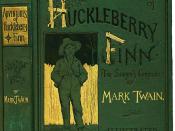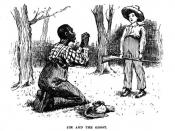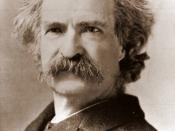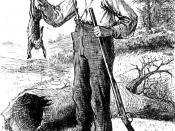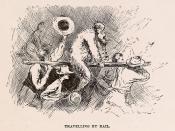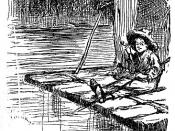Finding One's Place Within Society Most people would agree that children enjoy being read to and, that parents ought to read to their children regularly. Why is this? The answer is very simple. Children's books foster imagination and teach lessons. At a young age, we realize the potential and importance of vicarious experiences that can be achieved through literature. When we read a book, we are given the unique opportunity to try on a point of view and see things from a different perspective. We probably wouldn't read a young child a book about intermolecular forces, because he would find the subject matter confusing and most likely not interesting. Although as adults, our level of understanding increases, not much changes: as with children, a book must first capture our attention before we are willing to continue. More importantly, if we are unable to relate to the story we are reading, as children would most likely be if we read to them from a chemistry book, the moral of the story or main point often falls on deaf ears.
Thus, this paper will explore a topic to which most readers can relate: the quest for acceptance and the compelling need for one's own place within the community. Webster's Dictionary defines community as "a unified body or group of individuals who often live together and share a common history or common social, economic, and political interests"ÃÂ. As children playing in the schoolyard during recess, we quickly learn, often painstakingly, the importance of fitting in (oh, the horror of being chosen last for kickball!) and, as we grow older, fitting in often becomes more difficult as we perhaps learn that the world isn't as kind as we had thought. Then, as teenagers, we apply to colleges and put our hearts into being accepted into what we believe to be the ideal community. The desire to be accepted and to fit in is one which governs our lives.
The protagonists of The Swindler, The Adventures of Huckleberry Finn and Wide Sargasso Sea - Pablos, Huck and Antoinette, respectively - attempt to find a community in which they feel most comfortable. Through these stories, we, as readers, are given the opportunity to observe and sympathize with the situations of the protagonists who struggle, as each of us has done, is doing or will do, to find his proper place within a community.
The Swindler, a fifteenth century Spanish novel, written by Fansisco de Quevedo, is a prime example of a man who is a part of many communities but never fully belongs in any one community. Pablos, the protagonist, has a constant, seemingly never-ending thirst for acceptance which is never actually quenched. Pablos seeks a community in which he can be himself, whomever that may be. Often, Pablos feels a certain sense of belonging, but he never truly becomes a part of any one community, something of great importance to him.
The novel begins with Pablos condemning his parents' occupations and promulgating his aspirations to be an upright and well-educated man. Pablos is clearly ashamed, and perhaps rightly so, of his father, a thief, and his mother, a harlot. Pablos despises his parents for not wanting a better life for their only son and he also despises them because he knows that he is a social outcast because of them: due to his parents occupations and low values, Pablos is often ridiculed and seldom respected. In a desperate attempt to find his place within the community, Pablos becomes a servant to his noble friend, Don Diego.
As Don Diego's servant, Pablos travels to AcalÃÂ where he is at once rejected by the other attendants who make it their mission to torture the poor boy. After being duped and humiliated repeatedly by his peers, Pablos decides that things must change: "I determined to change my outlook. We made it up and from then on we all lived like brothers and nobody bothered me anymore in the schools or the courtyards"ÃÂ (111). Thus, Pablos gains respect and is admitted into the small community of servants by mastering the tricks of the trade: the art of lying, stealing and, taking advantage of the unsuspecting. Pablos truly believes that he has found his place in society and, when it is time for the next stage in his life he leaves AcalÃÂ most upset: "the day came for me to leave the best life I had ever had. G-d alone knows how I felt having to leave so many friends and acquaintances"ÃÂ (123). Although Pablos clearly enjoys being a part of this community he must move on. Thus, he continues on his way in search of a new community.
Later in the novel, while on his way to Madrid, Pablos encounters a gentleman thief and is instantaneously drawn into his mysterious ways of life. Before long, Pablos is accepted into the brotherhood and masters the skill of swindling: "I was well in with them as if we were brothers"ÃÂ (159). While he relishes being part of a seemingly true community and thoroughly enjoys working with and being respected by members of the entire town, it is also clear that he knows this acceptance is false: "you can always find life easy and friendly in criminal circles"ÃÂ (159). It is not surprising, therefore, that when the shade is opened and the true workings of Pablos and the gentleman thieves are revealed, Pablos does not hesitate to leave his felonious friends in the dust.
Pablos once again begins his never-ending quest for community and, eventually, on his way to Toledo he meets up with a group of actors, whom he pays in exchange for acceptance. At first he struggles to find his place within their group but ultimately succeeds. He gains a part in the play and the audience applauds his performance and then he begins to write his own plays. Within a month, he is highly respected within the group of actors and even begins to sell his poetry to young lovers and sacristans. For the first time, it seems as though Pablos may have found an honorable place both within his small group of friends and within society at large but, Pablos soon becomes bored with this and discovers that the church and many others look down upon acting.
Throughout The Swindler, Pablos searches for a sense of community and a feeling of belonging. Sadly, he never truly finds his one place within society, but merely wanders from group to group, longing to fit in.
Mark Twain's great American classic, The Adventures of Huckleberry Finn, details the adventures of a young boy, Huck Finn. Like Pablos, Huck struggles to find one community in which he feels truly comfortable being himself and doing what he pleases.
At the start of the story, Huck lives with Widow Douglas and her sister, Miss Watson. Although Huck is welcomed into their home with open arms, he is never truly at home here; he is, in essence, an orphan and neither Widow Douglas nor Miss Watson is his parent. Moreover, the adventurous and rebellious Huck cannot stand living under such strict rules. The Widow Douglas and Miss Watson are the representatives of the society that he rejects wholeheartedly. They both immerse themselves in the values of "civilization"ÃÂ, feeling righteous by punishing themselves with tight clothing and delaying their meals to say grace. From the very beginning Huck's unruly and often defiant nature shines through. Huck wants mainly to be left to his own devices, to sleep in hogshead, to wear his old rags and, to eat his food all mixed up because "the juice kind of swaps around, and the things go better"ÃÂ (2). To the orphaned Huck, these motherly women represent an artificial and empty society - one of which Huck has no desire to be a part. He yearns to find a community in which he can just be Huck.
Late one evening, when everyone is sound asleep, Huck sneaks out with his daredevil friend, Tom. Tom and Huck meet up with a few other boys and take an old boat to a large cave a few miles downstream. Once inside the damp cavern, Tom makes everyone swear secrecy and proceeds to explain his plan for forming a new band of robbers, "Tom Sawyer's Gang"ÃÂ. All must sign in blood an oath vowing, among other things, to kill the family of any gang member who spills the gang's secrets. This leaves Huck out; his mother passed away years ago and no one has seen his drunkard of a father in nearly a year. Huck is virtually an orphan and feels alienated from his group of friends. Finally, after moments of desperation, Huck remembers Miss Watson and frantically offers her as a substitute. The gang accepts Huck's proposal and he is welcomed back as a member of their elite society. The separation due to the fact that Huck has no parents is nearly inevitable; the boys do not hold it against Huck in the end, but it prevents him from being immediately admitted into the club. After a month, however, Huck loses interest in "Tom Sawyer's Gang"ÃÂ and voluntarily quits.
Desperate to escape his alcoholic and abusive father, Pap, Huck feigns his own death and eventually meets up with Jim, Miss Watson's "nigger"ÃÂ, who fled after hearing Miss Watson discussing the possibility of selling him to a slave trader in New Orleans. Huck chooses to estrange himself from his friends, father, Widow Douglas and Miss Watson. The social outcasts form an instantaneous bond and help each other survive the coming challenges. It is when the two males are roughing it together in nature that Huck feels he is truly accepted and can be himself. Travelling with Jim proves to be the lifestyle of his dreams, both adventurous and dangerous - it is the environment in which Huck feels most comfortable and in which he is most eager to stay.
One morning, Huck decides to go into the village and, in order to keep from being recognized as the boy who faked his own death, Huck disguises himself as a girl with a dress stolen from the houseboat. He lies to Mrs, Loftus about his name and his origin and she, not realizing that the girl standing before her is Huck, rambles on about Huck's murder and the suspected killers, Pap and Jim. When asked to restate his name, Huck accidentally calls himself "Mary Williams"ÃÂ. Suspicious Mrs. Loftus notes the contradictions and announces that he is not a girl but, she fails to realize that he is the boy who was supposedly murdered. She asks him to reveal his true identity and Huck replies that he is George Peters, a runaway orphan who is apprenticed to a mean farmer. Mrs. Loftus believes Huck's shrewd cover-up and sends him on his way. Unlike when with Jim, Huck is not welcomed for who he is; he feels threatened and refuses to share his true identity with anyone, realizing that if he admits who he is, his scheme may be discovered. Although everyone would love to hear that he is alive and well, the concepts of returning to live with Widow Douglas and turning Jim in are not the least bit appetizing.
Nevertheless, after lies not only to Mrs. Loftus, but later to the slave catchers, the Grangerfords, and despite all of his struggles to remain independent and continue living in nature with Jim, Huck Finn ultimately ends up just about where he was in the beginning of the novel: looking for some way to "get out from under"ÃÂ civilization and escape its stifling ways. At the close of the book, Jim has obtained his freedom and Aunt Polly comes, revealing the true identities of both Huck and Tom. Huck ends the novel by announcing that Aunt Sally wants to adopt him now, so he needs to start planning on heading west since he already tried to become civilized once before and did not like it: "I reckon I got to light out for the Territory ahead of the rest, because Aunt Sally she's going to adopt me and sivilize me and I can't stand it. I've been there before"ÃÂ (321). The ending seems to leave Huck right back where he started: desperately wishing to be someplace else, doing what he pleases, when he pleases.
Wide Sargasso Sea, Jean Rhys' literary masterpiece inspired by Charlotte Bronte's Jane Eyre, details a young woman's struggle for acceptance and quest for belonging. In this compelling novel about racial tension, the protagonist is torn between calling herself black or white. Existing as a white Creole female in post-emancipation West Indies, Antoinette Cosway lives a life of estrangement. While she is at once able to move between black and white cultures, she is accepted by neither: the black community does not accept her because she is white and, because of her Creole background, she does not fit into the world of her English husband, Rochester.
The story begins in ex-slave town of Martinique, Jamaica on the Coulibri estate, near Spanish town. In this oppressive, colonialist society, the half-white-half-Creole Antoinette bears witness to the tense and hate filled relationship between the whites and the blacks. The death of her planter father and the end of slavery reduce Antoinette and her family to poverty. Although not completely white, as descendants of former slaveholders, Antoinette and her family are shunned and ridiculed by the locals: "they hated us, they called us white cockroaches"ÃÂ (23). Martinique, a predominantly black town, displays an atypical relationship between races, one in which the blacks oppress and attempt to destroy the whites. Despite constant ridicule and alienation from the black community, Antoinette yearns still to fit in, even after the blacks burn her house, causing the death of her younger brother. As they flee Martinique, Antoinette sees Tia, a young black girl and her former friend, and runs to her "for she [Tia] was all that was left in my [Antoinette's] life as it had been"ÃÂ, only to have a rock hurled at her head in hatred (45). Antoinette is neither welcomed nor accepted into the black community on Martinique, despite her desperate desire to be liked.
Much to her dismay, Antoinette is sold into marriage to Rochester and, although their relationship runs smoothly for some time, the differences between Antoinette's Creole culture and Rochester's English culture become both apparent and destructive as the story progresses. Not only does Rochester not understand the Creole culture which is of utmost importance to Antoinette, but he is also understandably frustrated by the language barrier within their home. The problem is not that Antoinette does not speak English but, rather, that she also understands and speak, quite fluently, the native French patios. Rochester feels separated from his wife and he rejects her because she is so different than he. Antoinette realizes this and frantically attempts to win him back but, it is an impossible task.
Rochester moves back to England, taking Antoinette with him. By taking her away from her homeland, Rochester also takes away any chance that she may have in trying to establish an identity. Once in England, a place that Antoinette describes as a "cardboard world where everything is colored brown or dark red or yellow that has no light in it"ÃÂ, a place altogether different from the lush, natural world of the Caribbean, Antoinette realizes that she will never fit into this society and retreats into herself.
Tormented as a child for being biracial, unable to relate to her husband and keep him interested and, now living in a far away place most different from anything she has ever known, Antoinette goes mad. In short, her inability to be completely understood by either the white culture or the black culture leaves her as a woman without an identity driven to insanity.
These three novels, written about very different people, each illustrate a young person's desire to be a part of a certain community. We, as readers, although perhaps not able to relate to their stories specifically, understand and sympathize with the protagonists.
For Antoinette and Pablos, the prognosis is rather dismal. Neither one ultimately finds the community in which he or she belongs. Antoinette may perhaps find solace in the fact that she has at least, in a way, through her madness, has escaped the constraints of the communities which shunned her for not fitting perfectly into a mold. Despite all his journeys and struggles, Pablos, however, ends up in a place most similar to where he started. His main reason for searching for a new community was because he hated the dishonorable reputation that his parents had bestowed upon him and longed to be an honest man. In the end, however, Pablos lacks a sense of belonging and remains a dishonorable man. Although Huck ends up in a situation very similar to which he began in, unlike Pablos who similarly ends up in much the same place where he began, Huck has found his place in society and has learned more about himself. For Huck it is merely a matter a reuniting himself with his community. The reader can appreciate how much Huck has changed and matured throughout the course of the novel. Once a poor, uneducated boy Huck's character has grown tremendously - he is now intelligent young man. Huck has seen his ideal community in nature and now, separated from it and threatened by the thought of returning to live under someone else's rules, he longs to return to it.
As readers, we are provided the unique opportunity to walk in Huck's shoes, to change outfits with Pablos and to hear the innermost thoughts of Antoinette and, we do so excitedly for we are enthralled by their struggles. From this new perspective, we gain a wider sense of the characters in the book and the world in which they live and, perhaps most importantly, we can apply the lessons they learn to our own lives.
